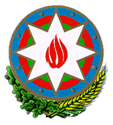Azerbaijan. Basic information
Basic information about Azerbaijan
Azerbaijan is a country of Transcaucasia north of Iran. The region was settled by the Medes before the forth century B.C. and was a separate kingdom after the death of Alexander the Great. Ceded to Russia by Persia in 1813 and 1828, the territory was a constituent republic of the USSR from 1936 to 1991 (It joined the USSR Dec. 30, 1922). Azerbaijan declared independence Aug. 30, 1991, and became an independent state when the Soviet Union disbanded Dec. 26, 1991. (See Azerbaijan Chronology)
The map of the Azerbaijan is shaped somewhat like an eagle in flight with capital (Baku city) for its head. Since the earliest times, this area has been known as "the land of flames".
|
Capital |
Baku |
|
Time Zone |
GMT +4 |
| Currency | Manat (AZN) 1 AZN ~ 1.26 USD (jan 2011) |
| Electricity | 220 V, 50 Hz (double pins european plug) |
| Main cities | Sumgait, Giandja, Nakhychivan |
| Languages | Azeri (official), Russian |
| Religions | Islam (mostly 86%), Christianity, Judaism |
| Export | Oil & gas, iron, copper, fruit, vines, cotton, silk, carpets |
| Area | 86,600 sq. km ( 33,400 sq. mi. ) |
| Population | 9,047,000 (2010) 7,600,000 (1997) |
| Flag |
|
|
National Emblem |
|
Trade System (Import and Export)
Azerbaijan's primary export products are diesel fuel and other oil products, cotton, oil drilling equipment and light manufactures. Licensing requirements have been removed for non-strategic exports. Export contracts have to be submitted to and approved by the Ministry of the Foreign Economic Relations as a control on export underinvoicing. Export taxes were imposed in March'95 on strategic goods whose domestic prices remained significantly below world levels, notably oil products and cotton. Unless special permission is issued by the Cabinet of Ministers, exporters must present evidence of prepayment or coverage by an authorisedletter of credit before the Customs will clear goods for export. There are no license requirements for imports apart from a few commodities which are controlled for health, environmental or security reasons. Low import duties are assessed which vary by product but not by country of origin
The Oil Consortium
In September'94, the Government signed a production sharing contract with a consortium of 11 international oil companies for the development of several deep water oil fields in the Caspian Sea. The contract specifies USD 7.5 billion in total investments over 15 years. As a signature bonus of the oil contract, Azerbaijan was granted USD 300 million. 'A new oil bonus of USD 173 million will be disbursed to Azerbaijan in tranches during 1995-98. Proven unexploited oil and natural gas resources are officially estimated at about 900 million metric tons, with substantial potentials below the Caspian Sea.
Labour Force, Employement, Wages, Prices
Azerbaijan's working age population (ages 16 through 59) remains almost constant at about 4 millions. Total employment is at about 2.5 millions. The lowest salary is paid in agriculture and social service. At the other end of spectrum were banks, insurance and the oil sector, where wages were 5-6 times higher than the economy-wide average.Thus, there is an abundance of cheap labour power in Azerbaijan. Qualification of labour power in a number of sectors (commerce, engineering, oil and chemistry, oil industry, etc.) is very high.Controls on most prices in Azerbaijan were lifted in 1992. in January'95, the Government took an important step toward full price liberalisation by announcing the abolishment of the state order system and the end of the bread price subsidy. At present prices of only public utilities and petroleum products remain controlled.
National Currency, Banking System
The manat was introduced in August'92 but became the sole legal tender only in January'94. Azerbaijan has a two-tier banking system which consists of the Azerbaijan National bank and nearly 200 commercial banks. International Bank of Azerbaijan provides international banking operations. Some foreign banks have started their activity in Azerbaijan recently. Currently, resident and non-resident persons or enterprises may freely open foreign exchange accounts at banks in Azerbaijan. No declaration of origin of the foreign exchange is required. There are no restrictions on repatriation of foreign exchange by local non-residents.
Privatisation
A framework law on privatisation was adopted in January'93, but progress in this area has been slow. Only petrol stations, taxi fleet and small commercial subjects have been privatised. A number of steps to accelerate the privatisation was taken in 1995, i.e. the State Privatisation Program for 1995-98 was re-drafted with the staffs of the World Bank and TACIS. It covers almost all state property, including 4 large state banks. It does not apply to the privatisation of the housing stocks and land. Foreign investors are also allowed to participate in privatisation process albeit subject to some additional conditions and restrictions.





